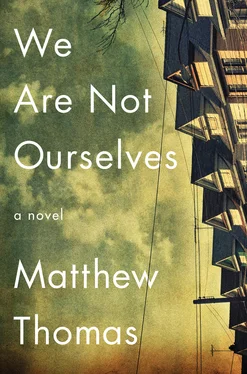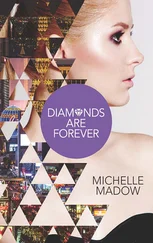All around were trays of prepared foods, folded napkins, polished silver, washed crystal, proliferating decorations, cookies she’d baked alone, scores of gifts she’d bought and wrapped herself.
“Not on your end,” he said.
“I try to preserve niceties like Christmas because it’s going to be hard no matter what I do or don’t do. The mind needs to be tricked sometimes.”
He had no idea how she withstood the deluge of inanity that flowed from his father. Connell couldn’t even be in the same room with him. He brutalized her, and when you confronted him on it he denied it like a scheming boy. He wanted her ready to attend him at a moment’s notice, yet he showed no sign of gratitude.
When his father came downstairs, bloody bits of tissue clung to his face like a swarm of exploded mosquitoes.
“You should use another razor,” Connell said. “The ones you use are cutting up your face.”
“There’s nothing wrong with my razor,” his father said.
“You should try the Mach Three.”
“Mine are perfectly fine,” his father said through gritted teeth, kneading his hands angrily.
“Or maybe an electric razor.”
“Why is everybody picking on me?”
“No one’s picking on you,” Connell’s mother said. “He’s trying to help you.”
“I don’t need any help. I do fine by myself.”
“You use too much cream,” Connell said.
“Goddamned ingrate!”
“Edmund!”
His mother followed Connell into his bedroom. “You should just love your father,” she said.
“I do,” Connell said. “I know.”
“These fights you’re having now — they won’t mean anything in twenty years.”
Connell cut her off. “And whatever I have to put up with is less than anything you had to put up with, I know.”
His mother seemed to be considering what he’d said. He couldn’t remember the last time she waited before reacting to him. It made him feel worse than when she just blew up.
“You need to think long and hard about what kind of person you want to be. That’s all I’ll say. Did you get your father anything for Christmas?”
Connell looked away.
“Here,” she said, and went to her pocketbook. She handed him a pair of twenties.
“What’s this for?”
“Go to the mall,” she said. “Get him an electric razor if you care about his face so much.”
• • •
On Christmas morning, after he’d given him the razor, Connell heard his father shaving with it. His father came down holding a Bic in his hands.
“This time, as it happens,” his father said, “I didn’t cut myself.”
“Good,” Connell said. “How do you like the electric razor?”
“I didn’t use it.”
“I heard it going.”
“You heard nothing of the sort,” his father said indignantly.
“I heard it.”
“You don’t know what you’re talking about.” He jabbed the Bic in Connell’s direction. “This is what I used.”
“No way. I heard it.”
His mother sighed, then abruptly snapped, “Would you leave your father alone?”
“Fine, fine.” Connell got ice from the freezer. “No, you know what? That’s bullshit.”
“Watch it!” his mother said.
“I heard it. Why won’t he admit it? Why won’t you admit it, Dad? It’s stupid.”
“I used the Bic.”
“You didn’t!”
“I used it like this.” His father put the razor up to his face and started digging at his dry cheeks. He winced, kept going. “Like this.”
“Stop!” Connell’s mother screamed. “Stop, stop!”
Connell went to take it from his hand. A dewdrop of blood clung to his father’s chin. His father shifted and lunged the razor at him. Connell reared his head back.
“Ed!” his mother screamed.
“Okay!” Connell said. “You used the Bic!” He tried to wrest it from his father, but his father dropped it and grabbed him by the wrist, twisting it.
“I did use it.”
Connell was in pain. “Will you use the other one for me, Dad? Because it’s Christmas. I got it for you for Christmas.”
“Sure.” His father released his grip. “What other one?”
“The razor I got you.”
“I used it already,” his father said, smiling. “Works like a charm.”
Connell eyed the razor on the floor. It looked like a piece of bloody evidence. His wrist throbbed. He thought of picking the razor up and holding it at his father himself.
“I’m glad you like it,” he said quietly.
“It’s a great gift,” his father said, rubbing his chin and looking curiously at the blood on his palm. “A great gift. You’re a good kid.”
Connell saw his mother’s face twist up as she turned to the dishwasher. She seemed to be fighting back tears.
“Now can we please have a nice Christmas, please?” she asked. “Can we all forget everything and have a nice Christmas?”
In the middle of a Valentine’s Day commercial, his father stood and went out without his jacket. He was halfway down the driveway when Connell caught up to him.
“Where are you going?”
“It’s Val, it’s Valen, Valtine’s. I’m going to get a Valen-en-tine’s card for Mom.”
“We can go when Mom gets home with the car. It’s freezing.”
His father turned and headed down the street. Connell called after him, then ran inside, grabbed their coats, and caught up with him. His father was shivering as he walked with purpose. Connell could barely stop him long enough to get the coat on him.
“I’ll go with you,” he said. “Slow down.”
They walked into town, buffeted by wind. Connell took his father’s elbow and led him into the stationery store and to the aisle of Valentine’s Day cards. His father picked up card after card and made a pile of them in his hands.
“Wait, Dad.” Connell laid a hand on his shoulder to calm him down.
“I need it,” he said, panting.
“Let me help you.” Connell wrenched the pile of cards from his father’s hands. He led him to the cards for wives. “Everything from here to here,” he said, drawing an imaginary rectangle with his finger.
His father quickly made another pile. Connell tugged them from his hands.
“Do you want me to pick out a good one for you?”
“Yes!” his father shouted joyfully.
Connell found one embossed “To My Beloved Wife” in cursive above a bouquet of flowers. Inside was one of those generic sentiments that made him wonder how people ever brought themselves to purchase these things. It looked the part of the cards his parents had exchanged in the past, though, and he didn’t want to get too particular. He handed it over.
“That’s very nice,” his father said quietly. “Very nice.”
As long as he was there, he figured he might as well pick one out for Kaitlin. He found one that, oddly enough, more or less captured how he felt about her, and he knew he was going to have to undercut the sincerity of the message with a little humor, to make it less awkward, so he bought a joke one too.
She liked the Starbucks by the train station. She’d heard some grumbling when it opened; Häagen-Dazs had been the lone exception to the town’s embargo on chain stores. But she saw no reason not to patronize it. She liked the Italianate style of the building, the tiled roof, the real wood. The patio and its tables reminded her of one of the piazzas she’d seen on her trip to Italy with Ed. Sometimes she took her coffee out there and watched the professionals heading to the train and the purebred dogs pulling their owners forward, though usually she sat indoors.
She went on Saturdays, to get away from Ed for half an hour. She didn’t gravitate there for any caffeinated talk. She went because it was acceptable to sit alone among strangers and because order prevailed: the line moved quickly, pastries were stacked neatly behind glass displays, the pleasant smells of frothed milk and espresso grounds suffused the air, the music never hurt her ears, and the overheard conversations never devolved into table-slapping self-indulgence. She liked that it lacked the ambience of smaller cafés, with their intimate conspiracies. There wasn’t that feeling that she was missing out. People were islands even when they sat together. She liked that no matter how often she went in, the staff never seemed to recognize her. She wanted not so much to be alone as to be left alone. They let her stay as long as she wanted.
Читать дальше
Конец ознакомительного отрывка
Купить книгу












